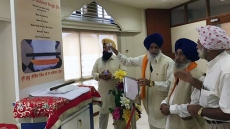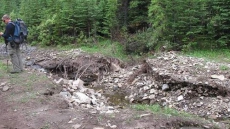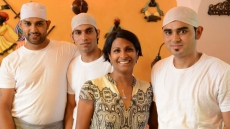Prime Minister Narendra Modi on Tuesday touched on the shared Islamic heritage of India and Central Asia, which, he said, has always rejected the forces of extremism, as he urged for boosting defence and security cooperation to defend the region's peace and defeat terrorism and rising extremism.
In his address at the Nazarbayev University in the Kazakh capital, Modi also said India's engagement with Central Asia has been short of promise and potential and added that he is determined to change it with closer cooperation.
Speaking on the shared heritage of India and Central Asia, Modi said the Islamic heritage of both India and Central Asia "is defined by the highest ideals of Islam - knowledge, piety, compassion and welfare. This is a heritage founded on the principle of love and devotion. And, it has always rejected the forces of extremism.
"Today, this is an important source of strength that brings India and Central Asia together."
He spoke of the close connection between the two sides through Bollywood, Sufi music, yoga and Hindi, adding: "It is the foundation of a relationship of hearts and emotions. And, it cannot be measured only by the scale of trade or the demands of states."
Speaking at length on terrorism and extremism, Modi said: "We live at the frontier of instability. We live close to the crucible of extremism and terrorism.
"We see terrorism spawned by nations and groups. Today, we also see cyber space become a platform without borders for terror to draw recruits to its cause.
"From theatres of conflicts to the calm neighbourhoods of distant cities, terrorism has become a global challenge as never before."
Modi said India and Central Asia would combat terrorism through the "strength of our values and our commitment to humanism".
Terming India the new frontier of opportunities for the world and Central Asia a region of immense resources, talented people, rapid growth and a strategic location, he said: "So, I am here to start a new era in our relationship with Central Asia.A India is prepared to invest more in a new partnership of prosperity."
Pitching for boosting trade and connectivity with the land-locked region, he expressed hope that all of Central Asia would become members of the International North South Transport Corridor and said that India is keen to join the Ashgabat Agreement on trade and transit.
He said India's upgradation of Iran's Chahbahar Port would open up routes into Central Asia. "I also hope that we can restore the traditional route to Central Asia through Pakistan and Afghanistan".
Both sides would work together in the sector of minerals, industry, pharma, engineering and small and medium industries, he said.
He said India's membership of Shanghai Cooperation Organisation will deepen the regional partnership.
He called for Central Asia to flourish and regain its central role in Eurasia. "From Europe to Asia, all nations must foster a climate of cooperation and collaboration, not competition and exclusion, in this region."
"The region must remain stable and peaceful, free from conflict and the violence of extremism and terrorism," he said.
"We will all work together to build the Silk Route of the 21st century. We will connect through space and cyber as we will by air, land and sea."
Later, Modi inaugurated the India-Kazakhstan Centre of Excellence in Information and Communication Technology, which has a Param supercomputer given by India.

Modi and his Kazakhstan counterpart Karim Massimov also launched the first exploratory drilling of the Satpayev oil block by India's OVL and KazMunaiGaz through live video conferencing.
State-run ONGC's overseas arm ONGC Videsh Ltd. had in 2011 picked up 25 percent stake in the Satpayev oil block in the North Caspian Sea.
Later, addressing a CEOs forum, Modi urged Kazakhstan to participate in India's Make in India initiative, Smart Cities and urban infrastructure programme to create a win-win partnership.
He also praised Kazakhstan's development and progress, saying despite being landlocked the country has marched forward in development.
Citing the Satpayev oil block, Modi proposed that Indian oil firms could invest with new technologies in Kazakhstan's vast energy sector.
He also proposed cooperation in agriculture and milk production.
He also invited Kazakhstan to participate in modernization of Indian Railways in which 100 percent FDI is allowed.
Earlier, Modi held talks with Massimov after his arrival here on Tuesday from Uzbekistan on the second leg of his Central Asian tour.





